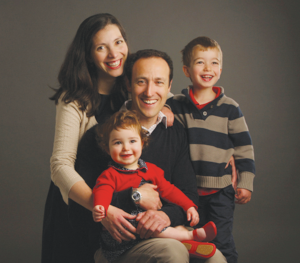 When Zoe Cassar gave birth to a healthy baby girl all was right in their little world. “My husband and I were overjoyed [and] our three-year-old boy was besotted with his baby sister.”
When Zoe Cassar gave birth to a healthy baby girl all was right in their little world. “My husband and I were overjoyed [and] our three-year-old boy was besotted with his baby sister.”
But three days after her daughter’s birth, Zoe developed an “unproductive cough” and rasp in her chest. A midwife checked her over and but couldn’t hear anything in Zoe’s chest. Zoe put her breathlessness down to poor ventilation and the flower arrangements in the hospital room.
Overnight Zoe began to feel much worse; feeling very fragile and too weak to breastfeed or even talk to others. A midwife checked her over and found her blood oxygen saturation was significantly lower than normal, and her blood pressure and heart rate were up. Zoe’s symptoms were dismissed as anxiety and Zoe went back to bed and cried, but resolved that if she was still feeling unwell when they arrived home, she would go to the local emergency department.
As it turned out, Zoe was at the emergency department by noon that day. Concerned by her symptoms and medical history, staff in the emergency department responded quickly, organising an ECG and blood tests. Zoe’s cardiologist was contacted and was able to ascertain from her scans and tests that Zoe was experiencing pregnancy induced heart failure and was dying.
Zoe spent another 10 nights in hospital and was started on heart failure medication that she will probably need to take for the rest of her life. She was told she may need a heart transplant if she didn’t respond to the medication.
 Zoe is one of around 1500 women who are affected each year by pregnancy induced heart failure or peri-partum cardiomyopathy (PPCM). Pregnancy induced heart failure is one of the biggest causes of maternal disability and death worldwide.
Zoe is one of around 1500 women who are affected each year by pregnancy induced heart failure or peri-partum cardiomyopathy (PPCM). Pregnancy induced heart failure is one of the biggest causes of maternal disability and death worldwide.
But there is hope, and we need your help to make a breakthrough happen.
One of our researchers, Dr Anthony Ashton, is currently working on a project investigating a possible cure for pregnancy induced heart failure. Anthony and his team have already identified a receptor which triggers the production of proteins in the placenta that cause pre-eclampsia in pregnant women, and they believe the same receptor may be central to the cause of pregnancy induced heart failure.
As well as looking at developing a drug that could possibly cure these conditions, Anthony’s team are also developing a blood test to detect women who will develop pre-eclampsia. This same test will identify women who may also suffer pregnancy induced heart failure, which would allow for more aggressive monitoring and management of their pregnancies and health in the months prior to and after delivery of their baby.
But it is only with the support of generous people like you that we can make a breakthrough happen.
Anthony is extremely passionate about the lives and health of expectant mums, “in the age of DNA sequencing and personalised medicine it is inconceivable that there are diseases we still don’t have remedies for. Both pre-eclampsia and PPCM are incurable, and more pointedly, untreatable conditions that threaten the lives of new mothers every day. Our mission is to provide every pregnant mother with the ultimate gift – long life and health for her and her new baby.”
To read more about Anthony Ashton and his work click here.
Donate today to accelerate life-saving research
Your donation will help make medical breakthroughs in heart disease happen.
